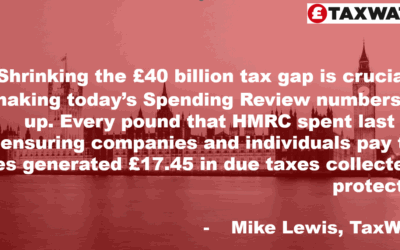-
Nothing for HMRC compliance despite huge returns on investment
-
Increases in sentencing for tax fraud and potential new tax offence– only useful if HMRC successfully prosecutes
-
Tax to be simplified – we’re still not sure exactly how
-
R&D reformed yet again
-
Generous reforms to audio visual reliefs – still not dealing with the problems
On Wednesday 15 March, the Chancellor Jeremy Hunt unveiled his Spring Budget 2023. While numerous news outlets have covered the major stories of the budget, at TaxWatch we are casting a forensic eye over the lesser covered tax stories.
Nothing for HMRC compliance
While this budget talks of “tackling the tax gap” it does not actually provide the necessary resources to do so. There is an investment in HMRC’s debt management capability, £47.2m, but nothing for compliance work.
HMRC’s compliance work has a return on investment of 18:1, meaning for each pound spent, HMRC can expect to recover £18 in additional tax revenue.[1]
In a Treasury Select Committee session on 23 November 2022, Emma Hardy MP (Labour) put this figure to Jeremy Hunt, who responded saying: “That is why he [Jim Harra, head of HMRC] got an extra £79 million. I hope he maintains that 18:1 ratio. If he can do even better, I will consider giving him even more money because it is very, very important that we do that.”[2]
It would appear that since HMRC has not increased the ROI on compliance work in the past five months, the Chancellor has not considered it a good use of funds to invest more in tackling the tax gap through compliance work.
Tax simplification – but what does it mean?
In ‘The Growth Plan 2022’, the then Chancellor Kwasi Kwarteng announced the closure of the Office for Tax Simplification. At the same time the plan stated that the government was going to “set a mandate to the Treasury and HMRC to focus on simplifying the tax code.”[3]
It was not exactly clear then what this meant, and it still isn’t clear now.[4] Earlier this month the Treasury Committee called for the Chancellor to explain why he believes the Office of Tax Simplification (OTS) should be abolished. We are still waiting on a formal response.
The Spring Budget provides some clue as to what steps are to be taken by HMRC and the Treasury to achieve this simplification. Pensions have seen an increase in the Annual Allowance and the removal of the Lifetime Allowance, reducing the number of taxpayers that need to report. There will also be a consultation around how sole traders calculate their income tax, and a review of HMRC guidance forms for small businesses. The government is also set to publish a discussion document on modernising HMRC’s income tax services.
Tackling Promoters of tax avoidance and increasing sentences for tax fraud
It was announced that the maximum sentence for the most egregious cases of tax fraud would double from 7 to 14 years. While all well and good, this needs to be accompanied by an increase in the number of investigations and ultimately prosecutions. Put simply, in order for there to be a deterrence effect, these criminal powers have to be used.
The government is also set to consult on the introduction of a new criminal offence for promoters of tax avoidance. It’s important that if and when a new offence is introduced, the government conducts follow up work to ensure that its used. There have been multiple occasions in the past where legislation is introduced, only to never be used.[5] Despite the Corporate Criminal Offence coming into force in September 2017, we are still yet to see a single prosecution utilising this legal power.[6]
R&D reform (again)
It wouldn’t be a budget without some kind of reform to the R&D reliefs.
After the Autumn statement 2022 reductions in the SME (small and medium enterprises) scheme benefits, there were promises to look at the needs of ‘R&D intensive’ businesses. In this budget these are defined as those businesses where the expenditure on qualifying research and development (under the existing schemes) is 40% or more of their total profit and loss expenditure. On the face of it, this announcement increases the benefits under the SME scheme for those businesses falling under the definition. However, it only increases the payable tax credit rate from 10% to 14.5%, the rate it currently is, and retains the lower additional reduction at 86% announced in the Autumn statement (previously 130%). This is therefore at best retaining the same benefits for a proportion of businesses conducting R&D, but continuing with the reduction for many.
This new announcement also brings in additional complexity to a relief which is already the target of abuse by advisers persuading businesses to claim amounts that are not due highlighted in TaxWatch’s recent report[7]. The reduction in scheme benefits at least partly arose out of concerns about this abuse. It seems likely that many of these firms are currently studying the new definition of R&D intensive businesses to try to find a way to present information such that their claimants qualify for the higher rates.
Additionally, for those businesses who are genuinely involved in advances in science and technology, the additional definition will likely lead to more complexity in an already complex claims process. This is hardly keeping in spirit with the direction to simplify the tax code. These changes will also result in more aspects of claims for HMRC to enquire into, at a time when HMRC appear to be incapable of handling current enquiries consistently and effectively.
The lack of any further investment in HMRC compliance (see above), despite calls for this from many different directions, suggests there will be little in the way of reduction of abuse of these reliefs and a greater compliance burden on legitimate R&D businesses for some time to come.
Reforms to audio visual reliefs
Film, TV and video games tax reliefs will be reformed, becoming expenditure credits instead of additional deductions from 1 April 2024.[8] There are large increases to the rates at which these reliefs will be paid, with relief increasing to 34% (from the current 25% on 80% of costs, meaning maximum of 20%). There are also further tweaks around qualifying expenditure.
What these reforms don’t do, is address the issues already present within these reliefs. The first issue is affordability. TaxWatch research found these reliefs are costing far more than anticipated, with the vast majority of these reliefs going to large multinational corporations. Video Games Tax Relief was estimated to cost just £35m a year when it was introduced, yet in 2021-2022 cost a record £197m – more than five times as much as anticipated.[9] The vast majority of this relief is going to large multinational companies.
The reforms don’t create new opportunities for avoidance, but they don’t deal with the current profit shifting that we see with the reliefs. There are examples with both Film Tax Relief and Video Games Tax Relief where companies are claiming hundreds of millions in relief, only to offshore the intellectual property. With this IP sitting outside the UK, foreign companies then distribute the product, with the revenues – and ultimately taxable profits – sitting offshore. The UK will continue to spend hundreds of millions of pounds subsidising entertainment products, with the corporation tax receipts these products generate ending up in foreign jurisdictions.
[1] Different areas of compliance have different returns, though this is thought to average out at 18:1. A Public Accounts Committee report on HMRC performance published in January 2023 used this return on investment ratio, https://committees.parliament.uk/publications/33390/documents/182713/default/
[2] Treasury Committee Oral Evidence Session, House of Commons, 23 November 2022, https://committees.parliament.uk/oralevidence/11933/pdf/
[3] The Growth Plan, HM Treasury, September 2022,
[4] In an evidential submission to the Public Accounts Committee, we recommended that the government should provide clarity about what it means when it talks of “simplifying the tax code”- Managing tax compliance following the pandemic, Written evidence submitted by TaxWatch, Public Accounts Committee, 26 January 2023, https://committees.parliament.uk/writtenevidence/115783/pdf/
[5] In 2016 the government introduced a measure to name and shame aggressive tax avoiders. In 2019, we revealed that not a single company had been listed http://13.40.187.124/hmrc_special_measures/. The Government also introduced a Procurement policy note in 2013 which sought to exclude companies engaged in tax avoidance from bidding for government contracts. In 2022 after sending FOIs to over 40 government departments, we found that this mechanism had never once been used.
[6] As at 01 January 2023, HMRC currently has 9 live CCO investigations. No charging decisions have yet been made. https://www.gov.uk/government/publications/number-of-live-corporate-criminal-offences-investigations/number-of-live-corporate-criminal-offences-investigations
[7] R&D – still changing after all these years, TaxWatch 14 March 2023, http://13.40.187.124/r_and_d_press_release
[8] TaxWatch recently submitted evidence to a HM Treasury Consultation looking at audio visual reliefs, https://assets.publishing.service.gov.uk/government/uploads/system/uploads/attachment_data/file/1142803/M5082_Government_response_to_consultation_on_audio_visual_tax_reliefs_.pdf
[9] “It is estimated that this generous new corporation tax relief will provide around £35 million of support per year to the sector.”, Video games companies to begin claiming tax relief, HM Treasury, 19 August 2014, https://www.gov.uk/government/news/video-games-companies-to-begin-claiming-tax-relief



